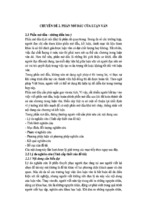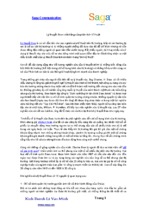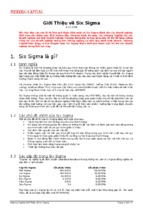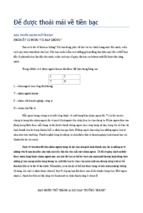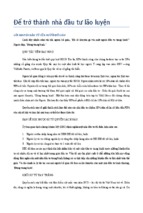152 x 230 mm
Research for Social Workers
PDF OUTPUT1
c: ALLEN & UNWIN r: DP3/BP5101W\PRELIMS
p: 6232 5991 f: 6232 4995 e:
[email protected]
36 DAGLISH STREET CURTIN ACT 2605
i
152 x 230 mm
This page intentionally left blank
PDF OUTPUT1
c: ALLEN & UNWIN r: DP3/BP5101W\PRELIMS
p: 6232 5991 f: 6232 4995 e:
[email protected]
36 DAGLISH STREET CURTIN ACT 2605
ii
152 x 230 mm
Research for
Social Workers
An introduction to methods
2nd Edition
Margaret Alston and Wendy Bowles
PDF OUTPUT1
c: ALLEN & UNWIN r: DP3/BP5101W\PRELIMS
p: 6232 5991 f: 6232 4995 e:
[email protected]
36 DAGLISH STREET CURTIN ACT 2605
iii
152 x 230 mm
First published in 1998
This edition first published in 2003
Copyright © Margaret Alston and Wendy Bowles 1998, 2003
Copyright © in cartoons Jenny Coopes 1998, 2003
All rights reserved. No part of this book may be reproduced or
transmitted in any form or by any means, electronic or mechanical,
including photocopying, recording or by any information storage and
retrieval system, without prior permission in writing from the publisher.
The Australian Copyright Act 1968 (the Act) allows a maximum of one
chapter or 10 per cent of this book, whichever is the greater, to be
photocopied by any educational institution for its educational purposes
provided that the educational institution (or body that administers it) has
given a remuneration notice to Copyright Agency Limited (CAL) under
the Act.
Allen & Unwin
83 Alexander Street
Crows Nest NSW 2065
Australia
Phone: (61 2) 8425 0100
Fax:
(61 2) 9906 2218
Email:
[email protected]
Web: www.allenandunwin.com
National Library of Australia
Cataloguing-in-Publication entry:
Alston, Margaret.
Research for social workers: an introduction to methods.
2nd ed.
Bibliography.
Includes index.
ISBN 1 86508 894 3.
1. Social service—Research—Methodology. 2. Research—
Methodology. I. Bowles, Wendy. II. Title.
361.3072
Set in 10/11.5 pt Palatino by DOCUPRO, Canberra
Printed and bound by South Wind Productions, Singapore
10 9 8 7 6 5 4 3 2 1
PDF OUTPUT1
c: ALLEN & UNWIN r: DP3/BP5101W\PRELIMS
p: 6232 5991 f: 6232 4995 e:
[email protected]
36 DAGLISH STREET CURTIN ACT 2605
iv
152 x 230 mm
CONTENTS
Contents
Acknowledgements
Introduction
1
2
3
4
5
6
7
8
9
10
11
12
13
14
15
vi
vii
Social work research
Choosing your topic area
Developing research questions
Steps in the research process
Sampling
Surveys and interviews
Needs identification and analysis
How do I evaluate my program?
Action research
Best practice evaluation
Other methods
Producing results: qualitative research
Producing results: quantitative research
Statistics for social workers
Influencing policy and practice
1
27
38
57
80
95
123
140
158
169
186
202
221
234
284
Appendix: Developing a research proposal
Bibliography
Author index
Subject index
305
316
326
328
v
PDF OUTPUT1
c: ALLEN & UNWIN r: DP3/BP5101W\PRELIMS
p: 6232 5991 f: 6232 4995 e:
[email protected]
36 DAGLISH STREET CURTIN ACT 2605
v
152 x 230 mm
ACKNOWLEDGEMENTS
Acknowledgements
We would especially like to thank our editors Elizabeth Weiss and
Catherine Taylor for their assistance and support in bringing out the
second edition of this book. Jenny Coopes’s cartoons flavour the
chapters with just the right spice. Thank you to our friends Eddie
Oczkowski and Veronica Paul who helped us over the rough spots
with many useful suggestions. Thank you to our partners, as ever,
for their ongoing support. We dedicate this work to Louise.
vi
PDF OUTPUT1
c: ALLEN & UNWIN r: DP3/BP5101W\PRELIMS
p: 6232 5991 f: 6232 4995 e:
[email protected]
36 DAGLISH STREET CURTIN ACT 2605
vi
152 x 230 mm
INTRODUCTION
Introduction
We are delighted to bring you the second edition of Research for Social
Workers. Since the first edition was published, social work research
has developed and this edition reflects many of these changes. There
is a new chapter on Best Practice and the chapters on statistics and
action research have been completely re-written. All the other chapters have been updated with most incorporating new material.
Our initial aims remain the same:
To make research methods accessible to students and social work
practitioners with plain English explanations of research concepts
and principles.
To enable social work students and practitioners to undertake
their own research by providing a step-by-step guide.
To encourage the social work community to become critical consumers of research.
To foster the new social work research culture which is emerging
world wide.
As social work practice has become increasingly sophisticated, the
place of research in social work has become more critical. Today,
research is relevant to just about every area of social work practice:
from the initial stages of an intervention, determining the needs of
an individual, group or community; through to testing new ideas and
deciding which course of action to take; and finally, to evaluating
practice and justifying social work’s existence. Springing from the
research traditions of sociology and psychology, social work is now
developing its own research orientation and knowledge base, providing fertile ground for social work theory and practice to flourish.
However, many social workers still do not recognise the potential of
research, nor its value for them as practitioners.
This book introduces research concepts and skills for social workers. It is for social work students as well as social work graduates
vii
PDF OUTPUT1
c: ALLEN & UNWIN r: DP3/BP5101W\PRELIMS
p: 6232 5991 f: 6232 4995 e:
[email protected]
36 DAGLISH STREET CURTIN ACT 2605
vii
152 x 230 mm
Research for Social Workers
who wish to brush up their research skills. Readers will gain not only
an understanding of the principles and approaches which are most
relevant to social work practice, but also a step-by-step approach to
undertaking research in their work. Research for Social Workers deals
with research issues from a social work perspective, using social work
examples and incorporating social work based methods. It has been
written as a guide for beginners in appropriately non-technical language, but it will allow readers to move into a research program
with confidence and ability. As teachers, researchers and social workers ourselves, we, the authors, are committed to enabling social
workers to include research as an essential part of their professional
tool kits. This means becoming critical consumers of research, as well
as confidently being able to incorporate research as part of everyday
practice.
Today, social work research reflects the many differences in
approach, politics and theory that exist in social work practice. Hence
it is important that social workers understand the variety of research
approaches available, and are aware of the different theories and
epistemologies on which they are based, so that their personal
approaches to research are more informed and explicit. Thus, the
book begins with a brief exploration of what constitutes the range of
social work research and how theories influence all aspects of research—from choosing the general topic area and the overall
approach, to defining the problem and selecting methodologies.
Because this is an introductory text for beginning researchers, the
various approaches are presented as ideal types to highlight the
differences and the debates which surround them. However, we do
not view the research process as consisting of mutually exclusive,
dichotomous approaches (for example: inductive/deductive or
qualitative/quantitative). In our own research we tend to use multimethod approaches and the examples chosen in the book reflect this.
Nonetheless, for an introductory text, we feel it is important to set
out the different approaches separately, so that beginning researchers
can clarify the differences and identify the different orientations in
existing research, as they develop their own conceptual approach to
research practice.
In chapter 1 we sketch an outline of different approaches to social
research, concluding with a discussion of the politics and ethics of
research. In these times when many social work programs are under
threat, it is particularly important to be aware of the various
ideological and political agendas of the different stakeholders in
the research process, and the policy and practice implications of the
research we undertake. In chapters 2 and 3 we cover the issues
involved in choosing your topic area and defining the problem. Steps
in the research process are summarised in chapter 4, and sampling
procedures are covered in chapter 5. Research methods which are
viii
PDF OUTPUT1
c: ALLEN & UNWIN r: DP3/BP5101W\PRELIMS
p: 6232 5991 f: 6232 4995 e:
[email protected]
36 DAGLISH STREET CURTIN ACT 2605
viii
152 x 230 mm
Introduction
most relevant to social workers—surveys, interviews, needs analyses,
evaluation, action research, methods of establishing best practice and
other methods—are discussed in chapters 6 to 11. Chapters 12 and
13 present different ways of analysing data and producing results,
with reference to the various computer software packages available.
Chapter 14 introduces statistical concepts and techniques. The book
concludes with a discussion of how to ensure that research leads to
action, and some of the most effective ways of influencing policy and
practice (chapter 15). Finally the Appendix provides a detailed guide
to writing your research proposal, including how to produce a
budget.
As the aims outlined in the beginning of this Introduction are
achieved, so will social work’s voice strengthen, and with this, social
work’s ability to achieve its mission of advancing the cause of disadvantaged groups, overcoming oppression and working to improve
well being for all people.
ix
PDF OUTPUT1
c: ALLEN & UNWIN r: DP3/BP5101W\PRELIMS
p: 6232 5991 f: 6232 4995 e:
[email protected]
36 DAGLISH STREET CURTIN ACT 2605
ix
152 x 230 mm
This page intentionally left blank
PDF OUTPUT1
c: ALLEN & UNWIN r: DP3/BP5101W\PRELIMS
p: 6232 5991 f: 6232 4995 e:
[email protected]
36 DAGLISH STREET CURTIN ACT 2605
x
152 x 230 mm
1
SOCIAL
WORK
RESEARCH
Social work research
This chapter introduces you to social research. First, some reassurance. Research is not all about numbers. If you are one of those social
workers or students who have had unhappy experiences with mathematics, do not despair! Social research is more about critical
awareness, careful thinking and the ability to view situations from
new perspectives than about numbers. In the twenty-first century,
there are a whole range of approaches to research—some involving
more mathematics than others. With the advent of computer software
packages, it is more important to understand the thinking or logic
behind the mathematics, and the theoretical perspectives behind the
thinking, than to be able to calculate the numbers themselves.
In this chapter we examine some of the different forms of research
and the power of the underlying beliefs which shape them. Quantitative, qualitative, emancipatory, feminist and postmodern influences
on research methods are discussed. Each of these offers a range of
possibilities for creative and exciting research for social workers. All
these approaches can be used by social work researchers and are
important for you to understand. As you will see, they are not
necessarily mutually exclusive. Indeed, much research today involves
a mixture of methods—that is, researchers use a ‘multimethod’
approach, selecting aspects of different approaches that best suit their
purposes. As this is a text for beginning researchers, we present the
approaches separately so that you can see how they have evolved,
and so that we can introduce some of the debates that surround them.
1
PDF OUTPUT
c: ALLEN & UNWIN r: DP3/BP5101W\PART01
p: 6232 5991 f: 6232 4995 e:
[email protected]
36 DAGLISH STREET CURTIN ACT 2605
1
152 x 230 mm
Research for Social Workers
In this chapter we also consider some of the important political
and ethical issues that surround research, before moving on in later
chapters to the ‘how to’ of different research approaches. First of all
we discuss what social research is and why, as social workers, we
should study it.
WHY STUDY RESEARCH?
Whether they realise it or not, most social workers are constantly
doing research or research-like activities. Consider the following:
A social worker wonders which counselling methods used by
different workers in her team are most helpful to the young
offenders they see on a regular basis.
A community worker, in a new job at a council, has a brief to find
out what the local community thinks of a planned development
to build an industrial complex in some bushland containing a
disused quarry.
A worker in a church-based agency holds a regular group for
homeless youth and suspects that many group members are facing
similar issues and problems in their lives.
A social welfare worker wants to know what effects the new
respite care service is having for families who are under stress.
A worker in the disability field, who has been asked to establish
a new service for young adults, wonders what life is like from
the perspective of the young people and what kind of services, if
any, they would like his agency to provide.
All these situations require research skills if social workers are
to address the questions and issues they face. The bottom line is: if
you are to make informed decisions or carefully thought through
actions/interventions, you need research skills.
More specifically, consider the following reasons for studying
research.
Becoming an informed research consumer
Social workers are often confronted with government or interdepartmental reports in which research and statistics are quoted. If this is
a familiar situation for you, you are probably uncomfortably aware
that you may have taken such reports at face value, and, because of
a lack of research understanding, you may not have the ability to
critique such reports. You should heed Royse’s (1991, p. 5) suggestion
that:
as an informed consumer, you ought to be able to know if too few
subjects were interviewed, if the methodology was flawed, or if the
2
PDF OUTPUT
c: ALLEN & UNWIN r: DP3/BP5101W\PART01
p: 6232 5991 f: 6232 4995 e:
[email protected]
36 DAGLISH STREET CURTIN ACT 2605
2
152 x 230 mm
Social work research
author generalised well beyond his or her findings. Research studies
can be biased or flawed for a lot of different reasons, and you might
not be able to detect these reasons without a basic understanding of
research methodology.
All social research has a political imperative. Some reports may take
liberties in the way research is presented in order to achieve or to
bolster a certain perspective. Some departments, keen to downsize,
for example, may disregard or under-report the success of certain
programs. Some statistics may be used inappropriately or out of
context to enhance an unsupported position. Likewise, some research
reports might enhance positive findings in order to ensure continued
funding. It is naive to think otherwise in an economic climate where
large cuts have been made to welfare spending.
Consider also that when outside consultants are used by an
agency or department to assess the organisation’s functions, you
should be in a position to critically analyse their work and examine
whether or not they have given you a fair appraisal. It is imperative
that you become an informed practitioner capable of dissecting the
information on which decisions are being made about policies which
affect your department or your programs.
Finding out about your practice
A second and equally important reason why you should have competent research skills is to allow you to justify your practice
interventions in an informed way. It is not enough to rely on your
intuition—intuition is susceptible to bias and may reflect your own
values rather than client benefits. In these days of increasing accountability to funding bodies and to the people for whom the services
are established, workers must be able to find out what the people
they are working with want and need, how their interventions are
affecting people’s lives, and how their programs and approaches can
be improved. More and more around the world social workers are
being expected to work in an evidence-based culture; that is, to know
if what they are doing is working or not.
There are a number of ways practice effectiveness may be
assessed. For instance, as a practitioner, you may be called on to
examine the effect of certain interventions on a group of clients. You
might also be called on to justify your agency’s effectiveness by
providing an evaluation of the use of its services and the effects of
the services on the client group.
Again, you might be called on to show you are meeting the needs
of a particular target group (needs analysis). Often practitioners keen
to continue a new program are expected to evaluate the program in
order that its effectiveness can be demonstrated—that it is meeting
its objectives, that it is developing as intended and producing desired
outcomes (program evaluation). The future development of the
3
PDF OUTPUT
c: ALLEN & UNWIN r: DP3/BP5101W\PART01
p: 6232 5991 f: 6232 4995 e:
[email protected]
36 DAGLISH STREET CURTIN ACT 2605
3
152 x 230 mm
Research for Social Workers
program may depend on well-constructed evaluation research. As
well, maintaining and indeed increasing your funding level may
depend on your analysis of research conducted to justify a service
(cost–benefit analysis).
It is also vital that you have the confidence and competence to
act as a contributing partner in research projects. There are often
occasions when your agency or department will conduct or contribute
to a research project. Having an understanding of research methods
will allow you to ensure that a social work perspective is part of the
project.
Participating in the policy process
We also need to develop our research tradition so that we are better
able to assess government social policies and to formulate such
policies. It is our role as a profession to take a lead in the formulation
of policy that affects the most vulnerable members of our community
and to attack or support government policies. In the past social
workers have not been known for applying pressure effectively—at
any level of government—to change or modify policies. As an example, there has been little noise from the helping professions
condemning the cuts in government welfare services and this is not
aided by the lack of data supporting retention of services.
With improved research skills, you will be on firmer ground in
joining in the policy process—in commenting on current policies or
evaluations of policy and in developing a case for new or different
policies.
Undertaking postgraduate education
Studying research at undergraduate level will facilitate your entry
into Masters and doctorate programs. This reason should not be
discounted, as it is our experience that students may be reluctant to
pursue postgraduate study because of their lack of knowledge about
research and their fear of attempting a major research project. Yet we
need such students to build a strong theoretical and research base in
order to upgrade the standing of our discipline. Of course you must
also be aware that studying research at undergraduate level is
a requirement of professional social work associations around the
world and so is a basic requirement for those of you wishing to attain
a social work degree.
Developing social work knowledge and theory
A very important reason for studying research is to aid in the
development of social work knowledge and theory. Having studied,
or being now involved in studying social work, you would be aware
that the development of social work theories rests on the shoulders
4
PDF OUTPUT
c: ALLEN & UNWIN r: DP3/BP5101W\PART01
p: 6232 5991 f: 6232 4995 e:
[email protected]
36 DAGLISH STREET CURTIN ACT 2605
4
152 x 230 mm
Social work research
of practitioners who are able to test and evaluate their usefulness.
We need these developments to come from social workers themselves
and not from other disciplinary areas. For all these reasons, and more,
you will benefit from the study of research methods.
Practising in an ethically responsible manner
Social work codes of ethics around the world support ethical research
practice. For example, the ethical codes of the British, American and
Australian social work associations all contain detailed sections on
how to undertake ethical research. We discuss this in more detail later
in the chapter.
W H AT I S S O C I A L R E S E A R C H ?
From the discussion above, it can be seen that many different types
of research are used in the welfare field. Which approaches you
choose depend on the purpose of the research, your background and
beliefs, the agenda of the organisation funding the research and,
increasingly, the perspectives of the people and/or programs being
researched.
Examples of the variety of social research used in the
welfare field
Needs analysis
Action research
Outcome evaluation
Cost–benefit analysis
Secondary analysis
Content analysis
Client satisfaction surveys
Qualitative in-depth interviewing
Nearly all forms of research involve the search for patterns or
themes—ways of simplifying a mass of information into meaningful
stories or relationships. Good research helps us to make links, gain
insight into apparent contradictions, explore new territory and raise
difficult questions. In the process of searching for patterns or themes,
all types of research involve some form of measurement. In chapters 2
and 3 we will explore the different types of measurement used in
the process of translating broad research issues into researchable
questions.
In the welfare field nearly all types of research are undertaken in
order to make a decision or to take some action. If we go to the
5
PDF OUTPUT
c: ALLEN & UNWIN r: DP3/BP5101W\PART01
p: 6232 5991 f: 6232 4995 e:
[email protected]
36 DAGLISH STREET CURTIN ACT 2605
5
152 x 230 mm
Research for Social Workers
trouble and expense of undertaking a research project, it would be
most disappointing if the finished report sat on a shelf gathering dust.
It is often said that research is a means of putting off tough or
expensive decisions. Instead of being the end of the process, your
report should be the first step in changing a policy, deciding on an
intervention strategy or setting up a new service.
Taking these considerations into account then, the definition of
research (below) describes the way the term ‘social research’ is understood throughout this book. The research literature contains as many
definitions of research as there are forms; this definition captures the
broad elements that are generally agreed upon as being shared by
most research that is undertaken in the social welfare field.
Definition of social research
Social research is the systematic observation and/or collection
of information to find or impose a pattern, to make a decision
or take some action.
It is difficult to define what is unique about research in social
work. However, McDermott (1996) makes a very good beginning
when she suggests that social work research:
Would be research that arises from a particular theorisation of the
acting subject within his/her social, political and economic context
Would be research that privileges the research process as an
intervention leading to the possibility of constructive change
Would be research that enables the participation of the
researched—the poor, the vulnerable, the oppressed and those
who interact with them (p. 6)
In any definition of social work research we must ensure that we
incorporate the tenets of the Social Work Code of Ethics that guide
all aspects of our practice. The power of research as a tool for social
change is fundamental to our understanding of the place of research
in social work. Just as the goals of social work involve not just
understanding the world, but actively intervening to change things
in some way, so, too, does social work research involve action,
decisions and change.
TYPES OF RESEARCH
The way that researchers find or impose patterns from or on the mass
of information available, in order to make decisions or take action,
depends very much on the beliefs and theories from which they
operate. Before we decide what type of research to do, it is important
6
PDF OUTPUT
c: ALLEN & UNWIN r: DP3/BP5101W\PART01
p: 6232 5991 f: 6232 4995 e:
[email protected]
36 DAGLISH STREET CURTIN ACT 2605
6
152 x 230 mm
Social work research
to understand the assumptions and perspectives which underlie the
major approaches to research, so that we are not ‘blinkered’ by our
methodology or unaware of its limitations.
The different research approaches used today are best understood
in the context of their history and how they developed in relation to
each other. We will discuss five of the major research approaches, in
order to demonstrate the variety that exists:
Quantitative research
Qualitative research
Emancipatory approach
Feminist research
Postmodern research
These research approaches are summarised as ideal ‘types’ rather
than actual descriptions of research as it happens in the ‘real world’.
The descriptions highlight the major differences between the
approaches to allow you to distinguish between the different types
and to think about which research methods would be most appropriate in different situations. In fact, many researchers use a variety of
methods, the multimethod approach, and the different approaches
themselves can have considerable overlap (Taylor 1993, Kumar 1999).
We begin with what was until recently the dominant and orthodox
form of research.
Quantitative research
Quantitative research is the oldest form of social research. It grew
out of the natural science paradigm of the eighteenth and nineteenth
centuries and the intellectual tradition known as ‘positivism’ (Mark
1996). This type of research is based on the idea that there is an
objective ‘reality’ which can be accurately measured, and which
operates according to natural laws which can be ‘discovered’ by
rigorous, objective research (Marlow 1998). Just as a natural scientist
in the nineteenth century might examine a rock and test its properties,
so it is assumed that a social scientist can ‘objectively’ study a group
or social system (Sarantakos 1998, Babbie 2001).
It is also assumed that the effect of the researcher’s own presence
is minimal or non-existent, so that ‘pure’ reality can be studied. That
is, it is assumed that whatever the researcher is told, or observes,
would actually be happening whether they were present to observe
it or not (Mark 1996). Similarly, it is assumed that any other researcher
who studies the same social phenomenon using ‘accurate’ research
instruments would come up with the same findings (Gibbs 1991).
Originally, the people who were being studied using this approach
were not included in the decision-making processes about the research (they were ‘objects’ for study rather than ‘subjects’ involved
in the process). Indeed, often the only concessions made to them
7
PDF OUTPUT
c: ALLEN & UNWIN r: DP3/BP5101W\PART01
p: 6232 5991 f: 6232 4995 e:
[email protected]
36 DAGLISH STREET CURTIN ACT 2605
7
152 x 230 mm
Research for Social Workers
being people rather than the inanimate objects researched in the
physical sciences were precautions taken to protect privacy, anonymity and safety.
Traditionally, researchers in the quantitative positivist tradition
begin with ideas or theories about the world, which they go out and
test empirically. Thus they carefully design the structure of their
research and the concepts they are researching before they go out
into the field. Going from the general to the specific, or beginning
with the theory and testing ideas empirically, is known as the ‘deductive’ approach to research (Marlow 1998, Cournoyer & Klein 2000, de
Vaus 2002). We will discuss how these ideas or theories are turned
into researchable questions in chapter 3.
At the most extreme end of the quantitative spectrum of research
methods lies experimental design. This type of research has recently
experienced a revival in some areas of social work research, particularly in the United States and some parts of the United Kingdom
(Trinder 2000). Experimental designs involve strict conditions including random assignment of subjects (people) to experimental groups
(the group being given the intervention) and control groups (the
group that does not have the intervention). The researcher manipulates the independent or treatment variable systematically to
determine what effects treatment (intervention) has on the experimental group. Because people are randomly placed in the control and
experimental groups, it is assumed that all the other factors (variables) which could influence or interfere in the effect of the treatment
variable are balanced out between the two groups. Thus, any change
measured in the experimental group can be assumed to be due to the
treatment variable. Proponents of experimental design in social work
argue that this is the only ‘true’ way of rigorously testing the effectiveness of interventions.
While experimental designs, also known as RCTs or ‘randomized
control trials’ (Trinder 200), may be possible in some social work
situations where a single intervention is being offered, such as correctional or prison settings, it is not always possible or desirable to
randomly allocate people to experimental or control groups, because
those in the control group will not receive the intervention—an
ethical dilemma. In addition, critics of this approach argue that social
reality cannot be reduced to simplistic manipulations of one variable
at a time—life is much more complex than this. Rather than being
‘objective’, this approach is based on a world view that assumes
humans act in ordered, rational ways. Critics of positivism and its
offshoots maintain that these assumptions are not universal truths,
but a particular theoretical perspective (feminist critics argue that this
reflects a largely white, male, middle-class view of the world).
Due to these and other considerations, a whole range of quantitative measures has been developed which ‘compromise’ one or more
8
PDF OUTPUT
c: ALLEN & UNWIN r: DP3/BP5101W\PART01
p: 6232 5991 f: 6232 4995 e:
[email protected]
36 DAGLISH STREET CURTIN ACT 2605
8
152 x 230 mm
Social work research
of the conditions of classic experimental research design. For example,
there are quasi-experimental single-case designs in which practitioners can evaluate the effects of their interventions with a single person,
and non-experimental surveys and group designs where inclusion in
the sample is not based on random allocation.
Quantitative researchers typically use techniques such as surveys,
questionnaires and structured observations. Using statistics, they
analyse the information they have collected to see if their ideas about
patterns or relationships are supported by ‘the facts’ as revealed in
their research. Because they are interested in ‘truth’ and discovering
natural ‘laws’ of society, quantitative researchers place great importance on whether the people they study are representative of a whole
population, and whether their results can be applied to this larger
group. Various sampling and statistical techniques are used in
attempts to ensure that conclusions can be ‘generalised’ (applied) to
all the people in the population and not just to those who were
included in the particular study.
Examples of quantitative research
The census
Large opinion polls
Some forms of evaluation, e.g. outcome evaluations, cost–
benefit analyses
Research which aims to establish whether there is a relationship between two or more variables, e.g. Is there a
relationship between income and religion?
Although quantitative research has provided many useful insights
into the social world, some of its most basic assumptions attract
stringent criticism. These have led to alternative research approaches.
A general term for a variety of research methodologies that has arisen
from critiques of quantitative approaches is ‘qualitative research’.
Qualitative research
Instead of beginning with theories of patterns or relationships and
testing them in the ‘real world’, qualitative researchers prefer to start
the other way around and begin with their experiences or specific
observations. They begin their research with no preconceived ideas,
and allow the patterns or themes to emerge from their experiences.
From careful observations, immersion in the world of the ‘researched’, in-depth interviews, and a range of other techniques,
qualitative researchers build their theories from the patterns they
observe in their data (sometimes called ‘grounded theory’; see, for
example, Strauss 1990). Thus, their approach is inductive: moving
9
PDF OUTPUT
c: ALLEN & UNWIN r: DP3/BP5101W\PART01
p: 6232 5991 f: 6232 4995 e:
[email protected]
36 DAGLISH STREET CURTIN ACT 2605
9








